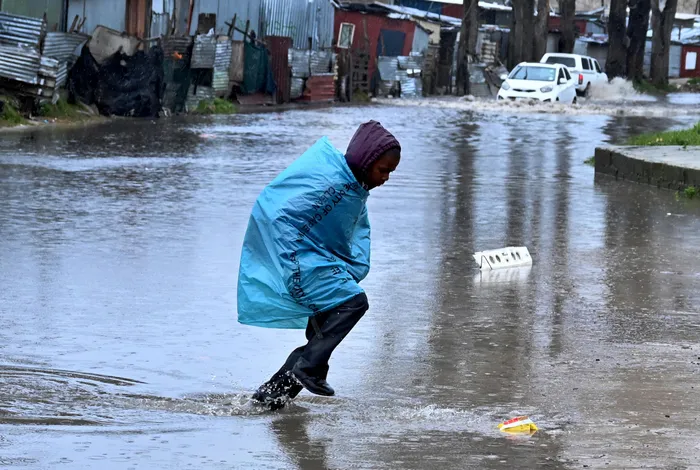
The frequency and the intensity of extreme weather events have brought home the realisation of climate risks for businesses, people’s lives and livelihoods, says the author.
Image: Ayanda Ndamane / Independent Newspapers
South Africa’s G20 presidency comes at a pivotal moment — where our ongoing efforts to address climate change and protect vulnerable communities are being tested by the urgent need to secure affordable energy and reignite inclusive economic growth from its current stagnation. In this context, bold and decisive action by world leaders at the G20 will be critical to advancing a development pathway that is both just and sustainable.
The frequency and the intensity of extreme weather events have brought home the realisation of climate risks for businesses, people’s lives and livelihoods. Climate change has ceased to be as distant environmental concern- It is already undermining livelihoods, deepening poverty, and placing new burdens on those least equipped to bear them.
Formed in 2020, the Presidential Climate Commission (PCC) has become an important organisation within the climate landscape involved in shaping South Africa’s climate future. The Commission brings together government, labour, business, and civil society in pursuit of a just, inclusive, and sustainable transition. Through robust multistakeholder engagement, the PCC has championed social dialogue, as a way to manage deep societal changes in the Just Transition space.
In 2022, Cabinet approved the Just Transition Framework after stakeholders and communities participated in its development, as PCC undertook extensive and inclusive nationwide consultations.
The Framework stands as one of our top achievements because it serves as the foundation for country’s transition to a low carbon future. The Just Transition Framework sets out a shared vision for the just transition, principles to guide the transition, arrangements to give effect to the transition.
This year marks the fifth anniversary of the establishment of the Commission This key milestone is an important moment for reflection on the PCC’s progress to date and simultaneously provides an opportunity for us to heed the call to increase our climate ambition.
While grounded in science and research, just transition is about improving lives and livelihoods - with special focus on workers and communities that are most affected by the transition now and in the coming years. The transition is about how we reshape our economy in ways that are inclusive, and sustainable. It asks hard questions about the pathways needed to support those at risk of being left behind.
Today, PCC has firmly established itself as a platform for social compacting, bringing together government, businesses, labour, youth, and civil society, in developing climate policies that foster inclusive governance, support sustainable development, and promote a just transition to a low-carbon economy.
To aid its work, the PCC released South Africa’s first State of Climate Action Report which is the first independent assessment of the state of climate action in South Africa. It presents a comprehensive overview of how climate change is impacting South Africa, the measures that different groups are taking in response, and the gaps where further progress is needed. A national climate perception survey was also undertaken, which showed growing support for renewable energy but also pointed to the need for better public understanding of the term “just transition.”

Dorah Modise, Executive Director, Presidential Climate Commission
Image: Supplied
Notwithstanding these developments, South Africa has done extremely well in planning climate change responses, as reflected by the country’s extensive climate adaptation policy landscape. However, policies alone will not and cannot drive climate action.
Our action plans to reduce emissions, be resilient to and adapt to climate impacts, as well as the National Determined Contributions (NDCs) demonstrate the link and imperative of national socio-economic development context. We advocate for a global energy transition that considers the socio-economic impact on developing countries and maintains industrial production in energy and related sectors and we will continue to seek to accelerate financial investment to reduce carbon emissions and respond to the challenges associated with global warming in line with the Agreement.
South Africa faces inevitable consequence of climate damages, prioritisation of climate adaptation actions, including increasing the share of South African funding explicitly targeting adaptation, is not an option. Rather, prioritisation of climate adaptation financing is essential to secure the development gains the country has achieved.
As we raise ambition and reconfigure our development pathways – we appreciate the complexity of the road to a net-zero economy but equally marvel at the opportunity to reshape and grow a new economy founded on sustainability goals.
As the country moves towards a low-carbon economy, just transition offers real opportunity to rebuild trust with communities and deal with practical issues relating to jobs, local economies, skills, social support, and governance. Ensuring fair access to these opportunities across all sectors and regions is central to our work. In a country where energy and job security are deeply intertwined, economic growth and social justice must go hand in hand.
The PCC published out two important findings on the decommissioning and repurposing of the Komati Power Station (KPS) in Mpumalanga. The process has become a test case for how to handle coal plant transitions.
Lessons learned from Komati's journey thus far are instructive for other coal-dependent communities on the brink of similar transitions. Firstly, a long-term vision aligned with regional and national objectives is essential. Secondly, early, inclusive, and sustained stakeholder engagement is non-negotiable. Thirdly, innovative, and adaptive financial models can significantly enhance the effectiveness and responsiveness of transition strategies.
Dorah Modise, Executive Director, Presidential Climate Commission
BUSINESS REPORT
Related Topics: